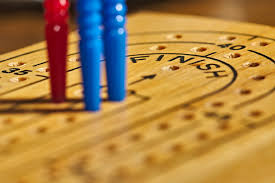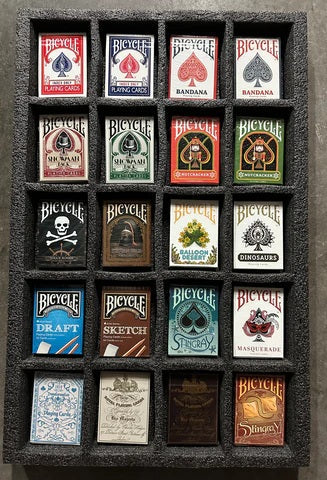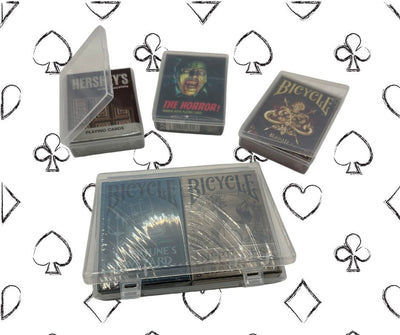(A traditional 121 Cribbage Board)
Card Game Rules
Cribbage is a two person card game played with a standard 52 playing card deck. The objective of Cribbage is to be the first to 121 points (or 61 depending on the version). In Cribbage, cards are ranked with Kings high and Aces low. Cards are worth their own value with face cards worth 10 and Aces worth 1. Unlike other card games, Cribbage is scored on a wooden board with pegs.
For other classic card games, see our guides for Go Fish and Solitaire.
If you are looking for cards to play Cribbage with, check out a standard pack here or one of our more recent arrivals here.
If you are looking for a Cribbage board, check out our 61 point travel board here.
Set Up
The players’ 3 pegs begin at 0 on the Cribbage board. To decide who becomes the first Dealer, the deck is shuffled and then each player selects a random card. The player with the lowest valued card becomes the first Dealer. The Dealer then passes out six cards to each player. Players then discard two of their cards to form a crib.
How to Play
Typically, players have 2 pegs, one in front of the other. Players are able to move their pegs alternatively forward on the board by scoring points in the three rounds: Peg, Counting, and Crib.
Peg
In the Peg round, players score points by taking turns laying down their cards. The non-dealer shuffles the remaining deck, selects one card randomly for the Counting and Crib rounds, and plays one of their cards. The dealer then plays a card against that card and so one.
In the Peg round, points are rewarded in the following ways:
- If a player makes 15 or 31 with the cards, they receive 2 points
- If they make a pair, they receive 2 points. Additionally, 3 of a kind is worth 6 points and 4 of a kind is worth 12 points.
- A run of 3 or more cards is worth how many cards are in the run. For example, a run of a 2, 3, 4, and a 5 is worth 4 points.
- If a player can not play a card equaling a 31 count or less, the opposite player receives 1 point. This is called a “Go”
- Placing down the last card is worth 1 point.
- If the randomly selected card is a Jack, it is called a heel. Heels give the dealer 2 point.
If the cards exceed 31, the Peg round restarts at 0 and the players proceed in playing their remaining cards.
Counting
In the Counting round, players score points by making combinations with their hand and the randomly selected card from the Peg round. The non-dealer goes first in the Counting round. Points are rewarded in the following ways:
- Each unique way to get to 15 is worth 2 points.
- A run of 3 or more cards is worth how many cards are in the run.
- If a player makes a pair, they receive 2 points. Additionally, 3 of a kind is worth 6 points and 4 of a kind is worth 12 points.
- A 4 card flush is worth 4 points. Additionally, a 5 card flush is worth 5 points.
- Having a Jack of the same suit as the randomly selected card is known as a nob. Nobs are worth 1 point.
Crib
As mentioned before, the two cards discarded by each player forms the crib. In the Crib round, only the dealer gets to count the crib and is rewarded points in the same number of ways as the Counting round, with the exception that a flush only scores if it includes the starter card.
After the Peg, Counting and Crib rounds are completed, the dealer position rotates, the deck is shuffled, new cards are given, a new random card is selected, and the rounds begin again. The first player to 121 (or 61 depending on the version) wins the game.
A free online version of Cribbage can be found here.
History

(John Suckling, the 17th century poet and inventor of Cribbage)
It is often cited that Cribbage was created by the poet John Suckling in the 17th century. Suckling developed Cribbage from the now rarely played game of Noddy, which was invented around the late 16th century. The lasting power of Cribbage is undoubtedly due to the fact that since the 1600’s, the rules have remained relatively the same. The only major change has been the adoption of an initial 6 card hand instead of the previous 5. Even then, most Cribbage players in the UK still adhere to a 5 card hand.
In addition to a stability in rules, Cribbage has remained a popular game throughout the centuries thanks in part to the Victorian novelist Charles Dickens. Dickens famously illustrated the game in his 1840 book The Old Curiosity Shop.
For more information on Cribbage, or its predecessor Noddy, check out David Parlett's two articles here and here.
For even more information on Cribbage, check out pagat's article here.
Variations
Kings Cribbage
Invented by Cococo Games, Kings Cribbage is much like a combination between Cribbage and Scrabble. To begin, 2-4 players select 5 tiles from a bag of 104 tiles. The tiles contain symbols on them that represent the 14 card types. The difference in coloration on the tiles represents the different suits. Players then take turns laying down 1-5 tiles on a Scrabble like board in hopes to win points. Points are given by making the same combinations one makes in Cribbage. For example, laying down three king tiles would be the same as making a 3 of a kind combination in Cribbage. The Cribbage point values are the same in Kings Cribbage as well. For example, a 4 card flush is worth 4 points.
Cribbage Solitaire
Cribbage Solitaire, as the name might suggest, is a one player version of Cribbage. To start, two 6 card hands are dealt. Then two cards from each hand are discarded to form the crib. A starter card is selected at random from the remaining deck. Regular play based on Basic Cribbage then proceeds with the player’s goal to reach 121 points.
Looking for more card games to play? Check out this article:
40+ Great Card Games For All Occasions
About the author: John Taylor is a content writer and freelancer through the company Upwork.com. You may view his freelancing profile here. He has a B. A. in English, with a specialty in technical writing, from Texas A&M University and a M. A. in English from the University of Glasgow. You may view his previous articles about card games here and his LinkedIn profile here.







9 comments
How do you get points you have ,hand, you have crib, how do you count points for play
Yes you do score 6. Three for a run 2 for 15 and 1 for last card
When playing cards, if dealer has a 2, then opponent has a 4, then dealer lays a 3; that is 3 points for a run of 3. If the opponent then lays down a 5 – does that still count for a run of 4? And if the dealer then lays down a 5, does that count for a run of 5? I get so confused as to when the run stops …..
Does the deck get cut for deal after match,or is the deal rotated from first cut?
When counting your hand, do you have to show your cards while counting? My husband holds his cards so I can’t see them, counts silently in his head, then lays them down and announces his score. I then have to count them for myself which takes time away from the game.